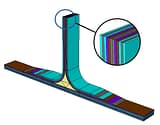
Where Do You Get the Courage to Sign the Blueprint?
Mathematical models have become indispensable sources of information on which technical and business decisions are based. It is therefore vitally important for decision-makers to know whether relying on the predictions of mathematical models is justified. When properly used, numerical simulation can be a major corporate asset. However, it can become a major corporate liability if the reliability of predictions is not guaranteed. Learn more in our latest blog post.
 Serving the Numerical Simulation community since 1989
Serving the Numerical Simulation community since 1989 














